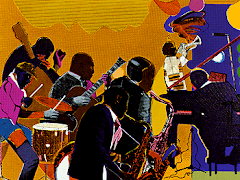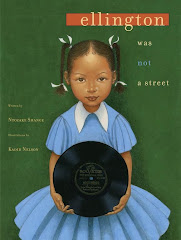Broadway: Les
Misérables
A Co-presentation of
the Kimmel Center for the Performing Arts and The Shubert Organization
A Review by Sojourner
Ahebee
On Wednesday evening of January
2, 2013, I attended The Broadway Series production of Les Misérables. What an
experience!
This story is an old one, drawn from Victor Hugo's classic novel which is also entitled Les Misérables. The story tells the tale and balances on the themes of the survival of the human spirit. Through transitioning from a traditional novel to a full blown musical performance, much is brought to stage and to light through the voices of the actors. The musical commences with the introduction of Jean Valjean (played by Peter Lockyer), an outcast who is kindly taken into the care of the Bishop of Digne. After many unfortunate situations, Valjean decides to start his life all over, with a fresh first step. Eight years pass and he has become a Mayor and a factory owner. For a brief moment the audience is allowed to breathe, with the good fortune that is born with Valjean's hard work. But, soon the audience gains a sense of these desperate times with the presence of the musical number “At the End of the Day”. While this is quite a heart wrenching song, what I appreciate about this number is that it is sung from the voices of the poor, more specifically, the workers and the unemployed. There are lines like: At the end of the day you're another day older/and that's all you can say for the life of the poor/ it's a struggle, it's a war. As Howard Zinn once mentioned, history is usually told from the the perspective of the privileged. This is not the case in this narrative. The sheer honesty present in this piece lends itself to much power.
Also, through the musical number “At the End of the Day”, we are introduced to Fantine (played by Genevieve Leclerc), one of Valjean's workers, who has a secret illegitimate child who is in the care of a couple she sends money to, to pay for her child's expenses. When the women in the factory discover this, they are enraged and demand for her dismissal. Their brutality towards Fantine is something I will never understand, but this situation surely lends itself to the tense environment of the narrative and also, it helps with the audience's ability to sympathize with Fantine.
With no job and no where to go, Fantine is forced to sell her locket, her hair, and later she must even resort to selling herself as a prostitute, so she can continue to pay for medicines for her daughter. I've never experienced a mother's love showcased on the stage with such omnipotence. While Fantine waits for customers, she ruminates on her lost love and wonders why she finds herself in this situation. These ruminations are present in the musical number “I Dreamed a Dream”. The lines in this song that really hit me hard were: but the tigers come at night/ with their voices soft as thunder/ as they tear your dreams apart/ as they turn your dreams to shame. This is later followed with the number “Lovely Ladies”, which further demonstrates the desperate environment, with the aid of the presence of the prostitutes. On a surface level, this song has quite an upbeat tune, but the darker undertones of having to sell your own body to make ends meet is very much there as well.
When a customer arrives, Fantine feels degraded and gets into a fight with this customer. She is about to be taken to prison by Javert( played by Andrew Varela), but Valjean arrives and demands she be taken to the hospital instead. Before he leaves Fantine in the hospital, he promises her that he will will find and look after her daughter, Cossette (played by Siri Howard).
Cossette has been staying with the Thénardiers, where she is abused by the family. After studying so much Shakespeare during my first semester of school, I have learned the importance of certain roles in theatre, especially those like the Shakespearean fool, who is there to teach a lesson but to also provide some type of comic relief. While Cossette was not a funny character, the presence of a child on stage, someone who wields bits and pieces of innocence, is what allows the audience to take a short break from all the tragic happenings in the play. Also, on a vocal level, I found it refreshing to hear a child's voice on stage. Cossette sings a song entitled “Castle in the Cloud” where she expresses her want to escape to another place, like a type of wonderland, as a means to escape the unkind family. Valjean holds his promise and finds Cossette. He makes a bargain with the Thénardiers, and they agree to let him take the girl and raise her as his own.
Years later, there is much political unrest in the city due to the situations of the workers and the common people. People become fed up and start to revolt. In Act 2 we are reintroduced to Cossette when she is older, and a boy named Marius, who starts to fall in love with Cossette. We are also re introduced to Éponine( played by Erin Clemons), the Thénardiers's daughter, who also loves Marius. But, if you want to find out what happens, I would highly recommend attending the performance at the Academy of Music.
The musical is full of energy, light, and most importantly truth. Also, this is a very vocally demanding piece, and the actors pull this off with much power! I never felt like I wasn't in the moment and these songs will stay in your head forever.
This
brand new 25th Anniversary production will be playing in
Philadelphia at the Academy of Music until January 13, 2013. To get more
information, click the link below!

























